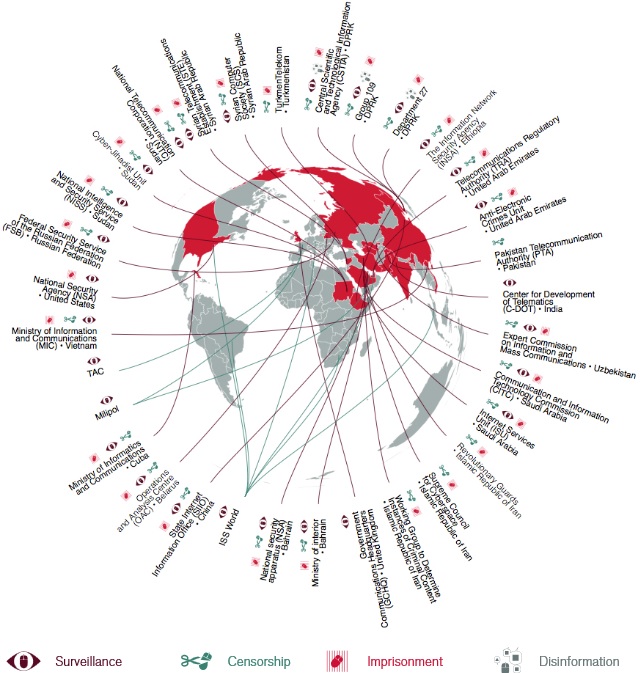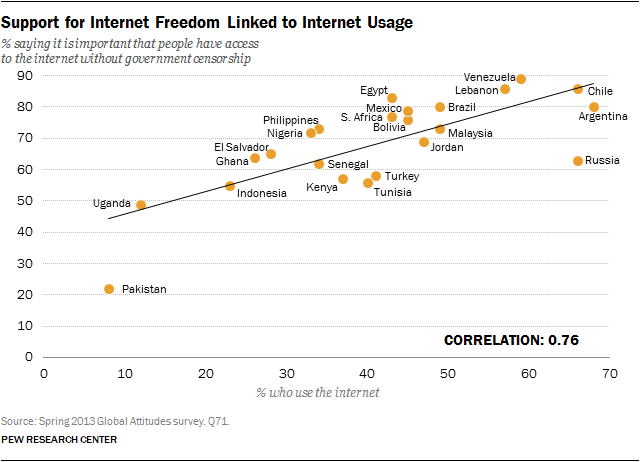Ethiopia, Sudan considered 2014 ‘Enemies of the Internet’
From 2011-2013, no African nation made the Reporters Without Borders annual list of Internet Enemies. A few (usually Egypt, Eritrea, and Tunisia) have often been shortlisted as ‘Countries Under Surveillance.’ Last week, however, the group released its annual report on international cyber censorship, this time including a variety of African government actions as threats to online freedom.
The 2014 report is more precise than those in the past; often government agencies rather than entire governments are in the spotlight. Worst offenders in Africa are Ethiopia and Sudan. Both score high for online censorship.
Overall, African nations fared well in terms of not overly censoring or watching over national internet activities. This isn’t to say African governments aren’t limiting online freedom, but relatively speaking, African government agencies are less intrusive than counterparts in China, Iran, or even the United States. RSF also exposes how national security can be used as pretext to monitor online activity, how draconian legislation can limit freedoms, and how censors go directly to ISPs to police activity.
Notably, the report points out the following African nations that experienced some form of online monitoring in the past year:
- Ethiopia‘s Information Network Security Agency (INSA) has tracked down journalists in the United States thanks to spyware provided by Hacking Team, an Italian company that Reporters Without Borders designated as an Enemy of the Internet in 2013. Authorities claim only limited online surveillance but there is a lack of legislation on the matter and the telecommunications monopoly plus limited internet access do not help create online freedom. Detailed analysis of Ethiopia’s online censorship.
- Sudan’s National Intelligence and Security Service (NISS) has gone far beyond its core duties by censoring or spying on journalists and other information providers. Also, authorities disconnected the Internet throughout the country for 24 hours on 25 September 2013 to prevent social networks being used to organize protests. Detailed analysis of Sudan’s online censorship.
- In Zambia, the Zambian Watchdog website reported in February 2013 that the Zambian government is working with China to install an Internet surveillance network. The blocking of the Zambian Watchdog and Zambia Reports websites in June and July 2013 showed that Zambia wants to be able control online information.
- In Tunisia, the government gazette announced the creation of a Technical Agency for Telecommunications (ATT) on 12 November 2013 for the purpose of monitoring communications in order to assist judicial investigations into “information and communication crimes.” Its sudden creation by decree without any consultation with civil society triggered immediate concern, as it revived memories of the Tunisian Internet Agency (ATI), the symbol of online censorship under ousted President Zine el-Abine Ben Ali. The lack of any safeguards and mechanism for controlling its activities is particularly alarming.
- In Somalia, for example, the Islamist militia Al-Shabaab banned using the Internet in January 2014. As it did not have the required skills or technical ability to disconnect
the Internet, it ordered ISPs to terminate their services within 15 days. Ironically, to ensure that the public knew of the ban, it was posted on websites sympathetic to Al-Shabaab.
-
In Gambia, the government gave itself a new legislative weapon in July 2013 by getting the national assembly to pass amendments to the Information and Communications Act – the main law limiting freedom of information. The amendments make the “spreading of false news against the government or public officials” punishable by up to 15 years in prison or a fine of 3 million dalasis (64,000 euros).
Recommendations on how to reverse the trend of internet censorship are perhaps too high level to be implemented at a national level. RSF highlights the need to strengthen national legal and regulatory framework governing Internet surveillance as it doesn’t meet international human rights norms. The thought is if more people are made aware of these nations’ actions then international bodies like the United Nations will adopt legislation to end the bad practices as soon as possible.
And RSF is right – a report released today by Pew Global finds there is widespread opposition to internet censorship in developing nations. The youth are especially in favor of online freedom. Most Africans surveyed fact-to-face in Spring 2013 agreed, with Uganda as the exception.
% saying it is important that people have access to the internet without government censorship:
- Egypt: 83%
- South Africa: 77%
- Nigeria: 72%
- Ghana: 64%
- Senegal: 62%
- Kenya: 57% (71% of high-income Kenyans say internet freedom is important, compared with 44% of people in the low-income category.)
- Tunisia: 56% (73% of Tunisian college graduates say it is important to have internet access without government censorship, compared with 54% of those without a college degree.)
- Uganda: 49%
Pew also found a correlation between internet usage and whether citizens feel online freedom is important:














 Twitter
Twitter Facebook
Facebook Pinterest
Pinterest